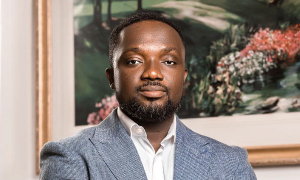[OPINION]Most African countries' petroleum revenue has simply disappeared
On Monday, the British firm Tullow Oil announced the discovery of the equivalent of 600 million barrels of oil off the coast of Ghana, one of the biggest oil discoveries in Africa in recent times. But is this discovery a good or bad omen?Even though the actual exploitation of the oil is still several years down the road, many in Ghana are already celebrating. An excited President John Kufuor told the BBC, "We're going to really zoom, accelerate, and if everything works, which I pray will happen positively, you come back in five years, and you'll see that Ghana truly is the African tiger, in economic terms, for development."
This type of exhilaration could be accepted as normal if it were coming from ordinary innocent Ghanaians. Ordinary Nigerians, Cameroonians, Congolese, Chadians, Angolans, etc. manifested this type of elation when oil was discovered in their respective countries. Today, it is no secret that after years of oil exploitation, most of the petroleum revenue in these countries simply disappeared. It is my opinion that Kufuor's elation about this oil find is a little bit naive. As a seasoned politician and African Union (AU) chairman, he is better placed to know that oil and other minerals have contributed more to African backwardness than the want of resources.
These resources have fanned civil wars in Nigeria, the Democratic Republic of the Congo, the Republic of Congo, Angola, Liberia, Sierra Leone and Chad. Coups and mercenary incursions have occurred in almost all resource-rich African countries. The corruption and graft that follows the discovery of these resources has destroyed the social fabric of many of these so-called oil or mineral producing African countries. Bad governance, weak and inefficient institutions, poor accountability, crime and parasitic state employees (now a hallmark of these countries) have all contributed to chase Africa's best brains out of the continent. There is no doubt that this brain drain is negatively affecting the competence and the commitment of those left behind to negotiate trade terms with foreign partners and administer these countries.
The AU should be seriously thinking about how they can negotiate the management of African resources with external powers. The current way of doing things will never move Africa out of backwardness. Leaders of most African countries are usually manipulated, cajoled, bullied or simply bribed to sign unfavorable contracts with foreign partners. Those that have resisted these pressures in the past have simply been "physically removed" or their governments subverted in one form or another.
Oil is the most important commodity in the world today and those that need that commodity most are very powerful nations. China and the United States are not going to fold their arms and allow Ghana to quietly enjoy the proceeds of the over $40 billion worth of oil (less exploration and production costs) that has been discovered. It has never been so in other oil producing African countries. The AU should understand this and accept the reality that many African countries can neither protect their resources from external economic predators nor negotiate fair trading terms with them.
The AU should envisage a formula in which powerful nations are guaranteed a fair portion of African resources in exchange for security and stability on the African continent and the justifiable utilization of resource proceeds for the interest of the African masses. Africans are sick and tired of false hopes. Many on the continent, including me, have come to see Africa's vast resources as a curse. I have lived through more than four decades (on the African continent) of turmoil, bloodshed, humiliation and poverty because of this abundance of natural resources. It is an irony but that is the reality on the ground.
Looking back at the role that oil has played in the economies of sub-Saharan African countries, I will bet that Ghana has a higher chance of becoming an African tiger without oil than it will with oil. When Kufuor declared to the BBC, "My joy is that I'll go down in history as the president under whose watch oil was found to turn the economy of Ghana around for the better," I wanted to tell him that he would leave a better legacy if he could use his position as AU chairman to find a formula for managing African resources.

















